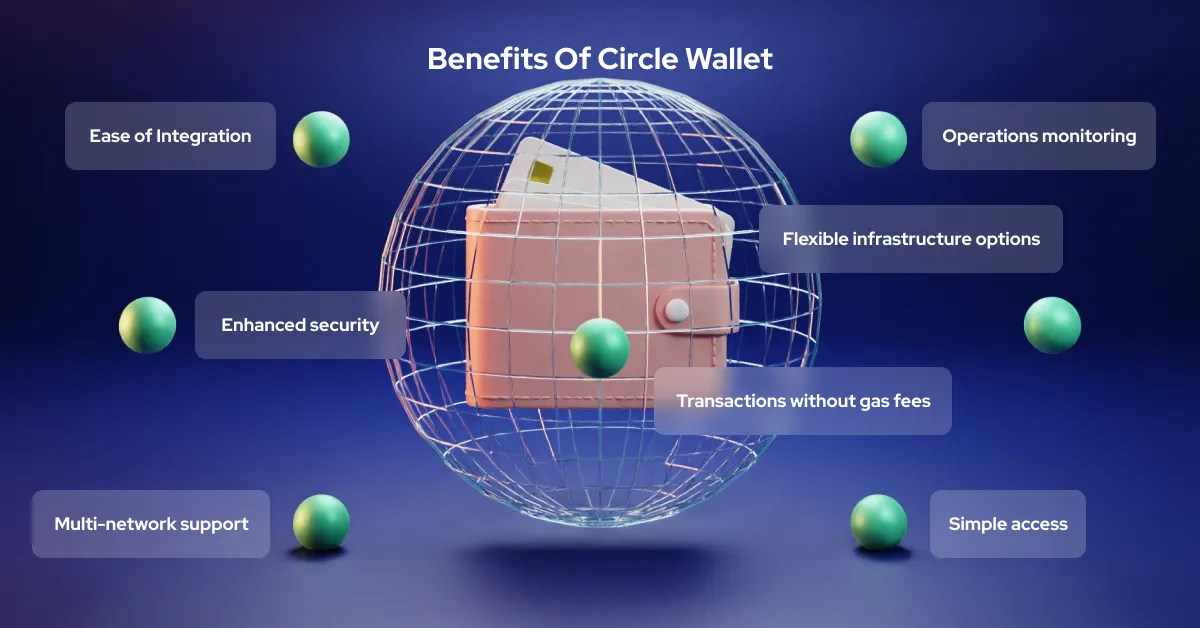
Announced on August 8, 2023, Programmable Wallet by Circle is the first product in Circle's Web3 line of services. It is a wallet-as-a-service platform that simplifies the creation and management of secure Web3 wallets and their private keys. Circle Wallet also enables developers to quickly deploy wallets on various blockchains, such as Ethereum, Polygon, and Avalanche using familiar APIs and SDKs.
The service is currently available in public beta and is expected to expand to additional networks and features in the future. What is Circle’s new Wallet all about, and how can you use it? Keep reading to learn everything you need to know about this new service.
Programmable Wallets is a new solution from Circle that lets developers integrate wallets into their applications to provide secure Web3 experiences without sacrificing ease of use and the overall user experience.
In reality, Circle Wallet is a handful of APIs that developers can plug into their applications to achieve their desired use case faster and easier than writing all the necessary code from scratch. Using these APIs, they can specify parameters such as the blockchain network where they want to create the wallet, deposit type, transaction type, transaction value limits, and more to generate custom-designed wallets.
Circle Wallet is built on multi-party computing (MPC) technology to provide an end-to-end solution for developers to create and interact with ERC-20 tokens including stablecoins and NFTs like ERC-721 and ERC-1155.
Multiparty Computing (MPC) is a next-generation cryptographic solution that enables multiple signatures. MPC manages private keys by distributing key fragments among multiple parties, protecting against accidental or intentional actions to misuse private keys.
It is possible to build applications independently of a specific blockchain network without having to write blockchain-specific code. Ethereum, Polygon, and Avalanche are currently supported, with other blockchains expected to follow soon.
Circle Wallet supports:

Circle Wallet works using an API created by Circle, and the interaction with that API is done using HTTP requests that are compliant with the REST standard.
To create a new user, send a POST request to the API with the appropriate request body in JSON format. This will give us a user ID, token, and secret key that represents the user's account, wallets, assets, and related transactions.
Next, you create a wallet for the user using the REST API. You can choose whether you want to provide a wallet controlled by the user or by the developer creating the wallet. User-controlled wallets require integration with the Android or iOS SDK to allow users full control over their wallets. Developer-controlled wallets don't require an SDK, but they mean the developer is responsible for keeping private keys safe.
You can then send and receive funds or NFTs using the REST API. You can also interact with smart contracts on the Ethereum, Polygon, and Avalanche networks.
For potential users, Circle Wallet may be an attractive option to integrate into their Web3 applications because it offers them the flexibility, security, and ease of use of cryptocurrency wallets. It may also be proof of the high level of competence and innovation of the software house that uses this service.
The wallet may be a way to improve the quality and functionality of their Web3 applications, as it allows them to better manage and optimize blockchain transactions. Also, it’s simply an interesting topic to learn about and experiment with new blockchain technologies and solutions.
Circle Wallet differs from other wallets in that it allows developers to customize the wallet for their specific users and applications. This is a service that offers many security and wallet control options, such as:
Industry experts are rather positive about the Circle Wallet, considering it an innovative and flexible service that makes it easier for developers to create attractive blockchain-based applications and increase user engagement.
To start using Circle Wallet, register with your email address and start building. There are no upfront fees or contracts. The implementation time of a new wallet from Circle depends on what type of wallet you want to build and how complex the requirements are.
And if you’re looking for a blockchain specialist to help you, get in touch with us - we have 9+ years of experience in the field and are up to date with the most recent developments in the world of blockchain.
